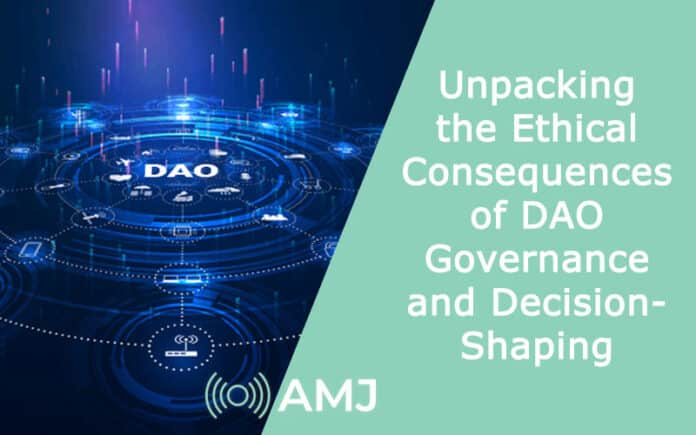In the rapidly evolving landscape of decentralized technologies, Decentralized Autonomous Organizations (DAOs) have emerged as a groundbreaking innovation. These entities are designed to operate without traditional hierarchical management structures, utilizing blockchain technology to facilitate decision-making processes. However, as DAOs gain prominence and play increasingly vital roles in various sectors, it becomes essential to delve into the ethical implications of their governance and decision-shaping mechanisms.
Contents
Understanding DAOs: A Paradigm Shift in Governance
Defining DAOs
A Decentralized Autonomous Organization (DAO) is a novel concept that leverages blockchain and smart contract technology to enable decentralized decision-making. Unlike traditional organizations that rely on centralized leadership, DAOs allow participants to influence and determine actions through voting mechanisms, fostering a more inclusive and democratic approach.
The Promise of Transparency
One of the primary attractions of DAOs is their potential to enhance transparency. The open and immutable nature of blockchain ensures that all transactions and decisions are recorded in a publicly accessible ledger. This transparency is touted as a safeguard against corruption and hidden agendas, thereby promoting ethical practices within the organization.
The Ethical Conundrums of DAO Governance
Limited Accountability
While transparency is a cornerstone of DAOs, it can also lead to challenges regarding accountability. With decision-making distributed among participants, identifying responsibility for unfavorable outcomes becomes intricate. This lack of clear accountability might result in individuals evading consequences for their actions, potentially compromising the ethical fabric of the organization.
Tyranny of the Majority
DAOs operate on the principle of majority voting, often sidelining minority perspectives. This “tyranny of the majority” can raise ethical concerns, as decisions favored by the majority may not necessarily align with the best interests of all stakeholders. Striking a balance between inclusivity and efficiency while upholding ethical values presents a formidable challenge.
Sybil Attacks and Manipulation
DAOs face the risk of Sybil attacks, wherein malicious actors create numerous fake identities to exert disproportionate influence on decisions. Such manipulation could undermine the integrity of the organization’s decision-making process, rendering it susceptible to unethical control.
Decision-Shaping and Its Ethical Implications
Influence of External Interests
As DAOs gain influence and resources, they might attract external interests seeking to sway decisions in their favor. This introduces ethical dilemmas related to the organization’s autonomy and its susceptibility to external pressures. Safeguarding the core principles of a DAO against undue influence becomes crucial.
Unintended Consequences
In the digital realm, the complexity of interconnected systems makes predicting the outcomes of decisions challenging. Ethical concerns arise when well-intentioned decisions lead to unintended negative consequences. DAOs must prioritize ethical considerations while navigating this intricate landscape of interconnected actions. One can invest in Ethereum using online trading platform, you can visit Ethereum Code site
Mitigating Ethical Concerns in DAO Governance
Robust Governance Frameworks
To address accountability and transparency concerns, DAOs can implement robust governance frameworks that clearly define roles, responsibilities, and mechanisms for addressing misconduct. Strengthening accountability within the decentralized model can help maintain ethical standards.
Inclusive Decision-Making
Preventing the dominance of a majority group necessitates the cultivation of an inclusive atmosphere that places importance on a variety of viewpoints. Establishing methods to take into account opinions from minority factions can result in more comprehensive choices that are in harmony with ethical standards.
Security Measures
In order to effectively counter Sybil attacks and manipulation, Decentralized Autonomous Organizations (DAOs) have the option to incorporate advanced identity verification systems and reputation-based mechanisms. These security protocols play a crucial role in ensuring that the decisions made within the DAO accurately represent the authentic intentions of its participants.
Conclusion
As the evolution of Decentralized Autonomous Organizations (DAOs) reshapes conventional concepts of governance, the integration of Ethereum Code into the Ethereum network emerges as a valuable tool for streamlining navigation. Amid this transformation, a crucial task involves a comprehensive assessment of the ethical ramifications inherent to DAOs’ operations. Navigating the intricate landscape of achieving transparency, enforcing accountability, and fostering inclusivity within the decentralized paradigm presents multifaceted challenges.
Nevertheless, by incorporating robust governance frameworks and adopting pioneering security protocols, DAOs can actively endeavor to not only uphold ethical principles but also catalyze advancements and forward momentum across diverse sectors. This dynamic interplay between novel technological solutions and ethical considerations signifies a pivotal juncture that paves the way for a more sophisticated era of decentralized governance and innovation.












![Index of Money Heist [Season 1, 2, 3 & 4 – All Episodes, Cast and Plot] Index of Money Heist](https://www.asiamediajournal.com/wp-content/uploads/2021/05/Index-of-Money-Heist-3-100x70.jpg)